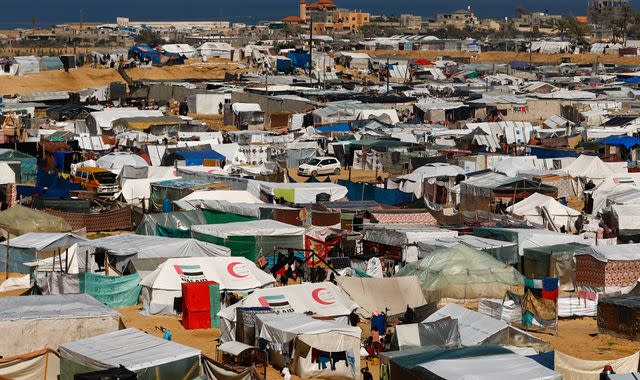Israel-Hamas war: Netanyahu orders evacuation of Rafah, as aid agencies warn escalation in refugee city will be 'devastating'

Benjamin Netanyahu has ordered the evacuation of Rafah, the southern Gaza city on the border with Egypt where an estimated 1.4 million people have been driven by Israel's military offensive.
The order from the Israeli prime minister comes ahead of an expected ground offensive in the area, where Palestinian refugees, unable to leave the territory, are living in makeshift tent camps or overflowing UN-run shelters with severe shortages of food and medicine.
A statement from Mr Netanyahu's office said: "It is impossible to achieve the war objective of eliminating Hamas and leaving four Hamas battalions in Rafah.
"On the other hand, it is clear that a massive operation in Rafah requires the evacuation of the civilian population from the combat zones.
"That is why the prime minister directed the IDF (Israeli Defence Forces) and the defence establishment to bring to the cabinet a dual plan for both the evacuation of the population and the disbanding of the battalions."
The plan for military escalation in Rafah was met with international criticism, including from the US and aid agencies.
President Joe Biden has said he considers Israel's conduct in the war to be "over the top" while the White House's national security spokesperson John Kirby said an Israel ground offensive in Rafah is "not something we would support".
The US State Department also said an invasion of Rafah "would be a disaster".
Rafah had a pre-war population of roughly 280,000. According to the UN, the city is now home to some 1.4 million additional people living with relatives, in shelters, or in sprawling tent camps after fleeing fighting elsewhere in Gaza.
In total, around 80% of Gaza's 2.3 million people have been displaced, with more than a quarter starving, the UN said.
The president of the International Federation of the Red Cross and Red Crescent Societies said on Friday that the humanitarian situation in Gaza is the worst she's ever seen.
"I saw people needing food, water, sanitation issues... We need to get humanitarian aid in," Kate Forbes said.
Meanwhile, UNICEF's executive director said any military escalation in Rafah would mark "another devastating turn" in the war.
Catherine Russell said a ground invasion could leave thousands more dead through violence or lack of essential services, and further disrupt humanitarian assistance. She also highlighted that around 600,000 children have sought refuge in Rafah.
"We need Gaza's last remaining hospitals, shelters, markets and water systems to stay functional.
"Without them, hunger and disease will skyrocket, taking more child lives."
The office of Palestinian President Mahmoud Abbas said that a military escalation in Rafah "crosses all red lines" and aims to drive Palestinians from their land.
Read more:
The scale of Rafah's vast tent city
Inside Gaza's tunnel network and hostage cell
How drone warfare is shifting global balance of power
It is unclear where civilians stuck in Rafah can evacuate to.
The Israeli offensive has caused widespread destruction, especially in northern Gaza, and hundreds of thousands of people do not have homes to return to.
Click to subscribe to the Sky News Daily wherever you get your podcasts
Egypt has also warned that any movement of Palestinians across its border would threaten the four-decade-old peace treaty between Israel and Egypt.
Israel has already launched airstrikes on Rafah. Nearly two dozen people including women and children were killed on Thursday night in bombardment on Rafah and central Gaza.
The health ministry in Gaza said 27,840 Palestinians have been killed since 7 October, when a Hamas attack on Israel killed about 1,200 people and abducted around 250.
Hamas is still holding more than 130 hostages, but around 30 of them are believed to be dead.


